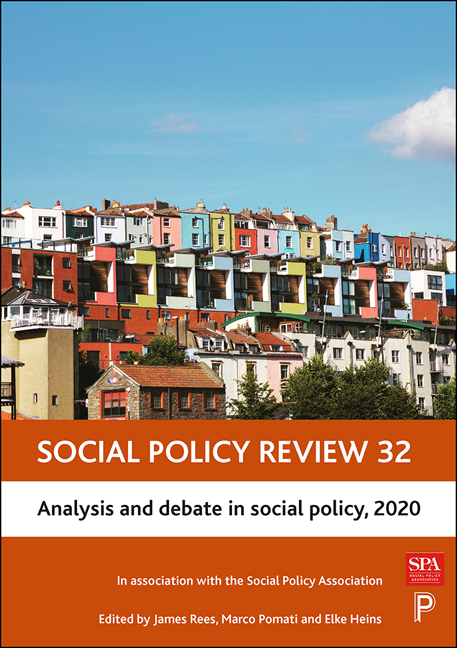Part III - Austerity
Published online by Cambridge University Press: 18 March 2021
Summary
The economic downturn of the late 2000s and early 2010s, now known as the Great Recession, led to a major fall in economic output that, combined with state support for the financial sector and fiscal stimuli, increased government debt and deficits around the world. This global financial crisis was followed in countries like the UK by a period of austerity, advocated on the grounds that government needed a period of fiscal consolidation. The theme of austerity has been at the forefront of most Social Policy conferences and publications but the impact of austerity on most aspects of life in the UK has been so great that it led to the damning report by the United Nations Rapporteur Professor Philip Alston and revived epidemiological interest in the effects of economic policies of austerity on suicides, morbidity and life expectancy (Karanikolos et al, 2013). Part III of the volume provides a critical review of some of the key policies implemented as part of this period of austerity and the implications that they have had on some of the most vulnerable sections of the population.
Over the past ten years, the government has deliberately chosen to make working-age benefits substantially lower through policies such as changes in social security indexation from retail prices to consumer prices, the benefit cap, the bedroom tax, the two-child limit and caps to local housing allowances. The Institute for Fiscal Studies estimates that social security cuts led to social security expenditure levels in 2019/20 that were £39 billion lower than they would have been without these cuts (Crawford and Zaranko, 2019). This was combined with an increase in benefit sanctions and the disruptive rollout of Universal Credit. In Chapter 9, Donald Hirsch explores the evolution of the level of benefits entitlement of different UK families and whether these are enough to meet minimum needs. Hirsch uses the Minimum Income Standard, a family-specific budget derived by iterative group discussions between people from a wide range of socio-economic backgrounds, supplemented by selective inputs from nutrition, domestic and transportation experts. The result of these discussions is a set of costed baskets of material and social needs required to reach a minimum acceptable standard of living, which can then be compared to income safety nets provided by the government.
- Type
- Chapter
- Information
- Social Policy Review 32Analysis and Debate in Social Policy, 2020, pp. 207 - 210Publisher: Bristol University PressPrint publication year: 2020



